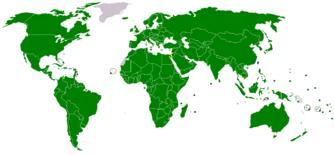UNESCO facts for kids
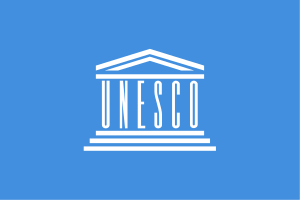
Flag of UNESCO
|
|
| Abbreviation | UNESCO |
|---|---|
| Formation | 16 November 1945 |
| Type | United Nations specialized agency |
| Legal status | Active |
| Headquarters | Paris, France |
|
Director-General
|
Khaled al-Anani |
|
Deputy Director-General
|
Xing Qu |
|
Parent organization
|
United Nations Economic and Social Council |
|
Staff (2024)
|
2,384 |
| Website | unesco.org |
The United Nations Educational, Scientific and Cultural Organization (UNESCO) is a special agency of the United Nations (UN). Its main goal is to build world peace and safety by encouraging countries to work together. They do this through education, arts, sciences, and culture.
UNESCO has 194 member countries and many other partners. Its main office is in Paris, France. UNESCO also has offices and teams all over the world.
This organization started in 1945, right after World War II. Its mission is to help create peace, support sustainable development, and protect human rights. UNESCO works in five main areas: education, natural sciences, social and human sciences, culture, and communication/information.
UNESCO helps with projects that teach people to read and write, offer job training, and advance science. It also works to protect free media, save important historical places, and celebrate cultural diversity. A big part of its work is identifying and protecting World Heritage Sites, which are places important for their culture or nature.
History
How UNESCO Started
The idea for UNESCO began long ago, even before World War II. In 1921, the League of Nations wanted to find a way for countries to share their knowledge in culture, education, and science. This led to the creation of the International Committee on Intellectual Cooperation (ICIC) in 1922. Famous thinkers like Albert Einstein and Marie Curie were part of it.
This early group helped countries work together. But their efforts were stopped by World War II. After the war, leaders realized how important it was for nations to cooperate. They wanted to prevent future conflicts by building understanding and peace.
Forming UNESCO
After World War II, many countries wanted to create a new organization. They hoped it would help prevent future wars. From 1942 to 1945, ministers of education from Allied countries met in London. They discussed how to build a global body focused on education and culture.
In November 1945, representatives from 44 governments met in London. They created the Constitution for UNESCO. Thirty-seven countries signed it. UNESCO officially began on November 4, 1946, when enough countries agreed to its rules.
The first big meeting of UNESCO members happened later that year. They chose Julian Huxley as the first Director-General. Over time, UNESCO's work has been shaped by major world events. These include the Cold War and countries gaining independence.
UNESCO's Growth and Key Projects
UNESCO has achieved many important things over the years. One major focus has been fighting against racism. In 1950, scientists and experts, including Claude Lévi-Strauss, made statements about race. These statements helped show that racism has no scientific basis.
In 1955, Republic of South Africa left UNESCO for a time. They rejoined in 1994, led by Nelson Mandela.
Education for All
From its early days, UNESCO worked to improve education. In 1947, it started a project in Haiti to teach basic skills. In 1948, UNESCO suggested that all countries should make primary education free and required for everyone.
Later, in 1990, the World Conference on Education for All began a global effort. This movement aimed to provide basic education for all children, young people, and adults. By 2000, many governments promised to achieve this goal by 2015. UNESCO also set global standards for higher education in 1998.
Protecting World Heritage
A famous early project was the International Campaign to Save the Monuments of Nubia in 1960. The goal was to move ancient temples, like the Great Temple of Abu Simbel. This saved them from being flooded by the Nile River after a new dam was built. Over 20 years, 22 monuments were moved to safety.
This success led to more campaigns to protect sites like Mohenjo-daro in Pakistan and the Acropolis of Athens in Greece. In 1972, UNESCO created the World Heritage Convention. This agreement helps protect important cultural and natural places around the globe. The first sites were added to the World Heritage List in 1978.
Science and Environment
In 1951, UNESCO helped create the European Council for Nuclear Research. This group later established CERN in 1954, a major science research center. UNESCO also worked on projects for dry regions from 1948 to 1966.
In 1968, UNESCO held a conference about the environment and development. This led to the Man and the Biosphere Programme. This program helps people and nature live together in harmony.
Promoting Free Information
Since its beginning, UNESCO has promoted the "free flow of ideas by word and image." This was important after World War II, when information was controlled. UNESCO started training journalists in the 1950s.
In 1980, UNESCO created the International Programme for the Development of Communication (IPDC). This program helps improve media in developing countries. In 1993, UNESCO supported the Windhoek Declaration. This declaration promotes media independence and led to World Press Freedom Day on May 3rd each year.
Changes in Country Memberships
In 2011, UNESCO welcomed Palestine as a member. Due to certain laws, the United States stopped its financial contributions to UNESCO at that time. Israel also stopped its payments. In 2019, Israel left UNESCO.
The United States rejoined UNESCO in July 2023, after having left in 2018. However, the United States announced its intention to withdraw again in July 2025, with the withdrawal becoming effective in December 2026. In May 2025, Nicaragua also announced its decision to withdraw from UNESCO, effective December 2026.
In 2023, Russia was not re-elected to the executive committee.
Cultural Policies and Sustainable Development
UNESCO continues to work on cultural policies and sustainable development. In 2022, it restarted the MONDIACULT Conferences. These meetings discuss how culture can help achieve the 2030 Sustainable Development Agenda.
Activities
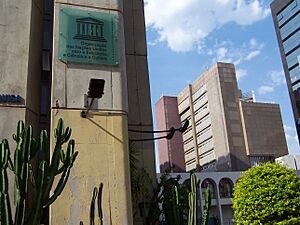
UNESCO carries out its work in five main areas: education, natural sciences, social and human sciences, culture, and communication and information.
- UNESCO supports research in education. It helps countries improve their education systems. This includes:
- UNESCO Chairs, a global network of experts working with universities in 126 countries.
- The Convention against Discrimination in Education, adopted in 1960.
- Organizing the International Conference on Adult Education (CONFINTEA) every 12 years.
- Publishing reports like the Education for All Global Monitoring Report.
- The Four Pillars of Learning, an important document about education.
- UNESCO ASPNet, a network of over 12,000 schools in 182 countries.
UNESCO does not officially approve colleges or universities.
- UNESCO also shares important public statements, such as:
- The Seville Statement on Violence: This statement, adopted in 1989, explains that humans are not naturally violent.
- UNESCO identifies and protects places important for culture and science, including:
- Global Geoparks Network, which protects areas with special geological heritage.
- Biosphere reserves, through the Programme on Man and the Biosphere (MAB), since 1971.
- City of Literature; Edinburgh was the first in 2007.
- Projects for Endangered languages and linguistic diversity.
- Masterpieces of the Oral and Intangible Heritage of Humanity.
- Memory of the World International Register, which preserves important documents and archives.
- Water resources management, through the International Hydrological Programme (IHP), since 1965.
- World Heritage Sites.
- World Digital Library.
- UNESCO encourages the "free flow of ideas by images and words" by:
- Promoting freedom of expression, freedom of the press, and freedom of information legislation.
- Working to keep journalists safe and fight against crimes committed against them.
- Promoting access to information and open solutions for sustainable development.
- Supporting pluralism, gender equality, and cultural diversity in the media.
- Promoting Internet Universality principles: the Internet should be based on human rights, be Open, Accessible to all, and involve many different groups (R.O.A.M.).
- Creating reports like World Trends in Freedom of Expression and Media Development.
- UNESCO promotes special events, such as:
- International Decade for the Promotion of a Culture of Peace and Non-Violence for the Children of the World: 2001–2010.
- World Press Freedom Day, on May 3rd each year.
- Criança Esperança in Brazil, which raises money for community projects.
- International Literacy Day, on September 8th each year.
- World Day for Cultural Diversity for Dialogue and Development, on May 21st each year.
- UNESCO also starts and funds various projects, like:
- Migration Museums Initiative: Creating museums to encourage cultural dialogue with migrant communities.
- UNESCO-CEPES, the European Centre for Higher Education.
- Free Software Directory: A project with the Free Software Foundation to list free software.
- FRESH, which focuses on Effective School Health.
- UNESCO Goodwill Ambassadors, who help spread UNESCO's message.
- The UNESCO Collection of Representative Works, which translated world literature.
The UNESCO transparency portal lets the public see information about the organization's activities and budget.
New Proposed Lists
Two new UNESCO lists have been suggested.
One list would focus on movable cultural heritage. This includes important artifacts and artworks. Examples could be the Mona Lisa from France or the Benin Bronzes from Nigeria.
The second proposed list would focus on the world's living species.
Media
UNESCO and its special groups publish several magazines.
The UNESCO Courier magazine started in 1945. It aims to share UNESCO's ideas and create a space for cultural dialogue. Since 2006, it has been available free online.
In 1950, UNESCO began publishing Impact of Science on Society. This magazine discussed how science affects society until 1992.
Official UNESCO NGOs
UNESCO works closely with 322 international non-governmental organizations (NGOs). Some of these have a very close relationship with UNESCO. The 22 NGOs with the highest level of affiliation have offices at UNESCO.
| Abbr | Organization |
|---|---|
| IB | International Baccalaureate |
| CCIVS | Co-ordinating Committee for International Voluntary Service |
| CIPSH | International Council for Philosophy and Humanistic Studies (Conseil International de Philosophie et des Sciences Humaines; publishes Diogenes) |
| CIOFF | International Council of Organizations of Folklore Festivals and Folk Arts (Conseil International des Organisations de Festivals de Folklore et d'Arts Traditionnels) |
| EI | Education International |
| IAU | International Association of Universities |
| IFTC | International Council for Film, Television and Audiovisual Communication |
| ICOM | International Council of Museums |
| ICSSPE | International Council of Sport Science and Physical Education |
| ICA | International Council on Archives |
| ICOMOS | International Council on Monuments and Sites |
| IFJ | International Federation of Journalists |
| IFLA | International Federation of Library Associations and Institutions |
| IFPA | International Federation of Poetry Associations |
| IMC | International Music Council |
| IPA | International Police Association |
| INSULA | International Scientific Council for Island Development |
| ISC | International Science Council (formerly ICSU and ISSC) |
| ITI | International Theatre Institute |
| IUCN | International Union for Conservation of Nature and Natural Resources |
| IUTAO | International Union of Technical Associations and Organizations |
| UIA | Union of International Associations |
| WAN | World Association of Newspapers |
| WFEO | World Federation of Engineering Organizations |
| WFUCA | World Federation of UNESCO Clubs, Centres and Associations |
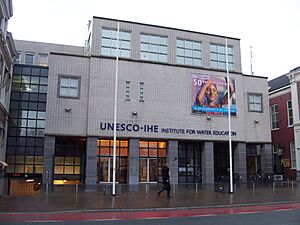
Institutes and Centres
UNESCO has specialized institutes and centers that support its programs. They provide expert help to offices around the world.
| Abbr | Name | Location |
|---|---|---|
| IBE | International Bureau of Education | Geneva |
| UIL | UNESCO Institute for Lifelong Learning | Hamburg |
| IIEP | UNESCO International Institute for Educational Planning | Paris (headquarters) and Buenos Aires and Dakar (regional offices) |
| IITE | UNESCO Institute for Information Technologies in Education | Moscow |
| IICBA | UNESCO International Institute for Capacity Building in Africa | Addis Ababa |
| IESALC | UNESCO International Institute for Higher Education in Latin America and the Caribbean | Caracas |
| MGIEP | Mahatma Gandhi Institute of Education for Peace and Sustainable Development | New Delhi |
| UNESCO-UNEVOC | UNESCO-UNEVOC International Centre for Technical and Vocational Education and Training | Bonn |
| ICWRGC | International Centre for Water Resources and Global Change | Koblenz |
| IHE | IHE-Delft Institute for Water Education | Delft |
| ICTP | International Centre for Theoretical Physics | Trieste |
| UIS | UNESCO Institute for Statistics | Montreal |
Prizes
UNESCO gives out 26 prizes. These awards recognize achievements in education, science, culture, communication, and peace.
Education Prizes
- UNESCO/King Sejong Literacy Prize
- UNESCO/Confucius Prize for Literacy
- UNESCO-Japan Prize on Education for Sustainable Development
- UNESCO Prize for Girls' and Women's Education
- UNESCO/Hamdan Bin Rashid Al-Maktoum Prize for Outstanding Practice and Performance in Enhancing the Effectiveness of Teachers
- UNESCO King Hamad Bin Isa Al-Khalifa Prize for the Use of Information and Communication Technologies in Education
Natural Sciences Prizes
- L'Oréal-UNESCO Awards for Women in Science
- UNESCO/Kalinga Prize for the Popularization of Science
- UNESCO-Equatorial Guinea International Prize for Research in the Life Sciences
- Carlos J. Finlay Prize for Microbiology
- UNESCO/Sultan Qaboos Prize for Environmental Preservation
- UNESCO-Russia Mendeleev International Prize in the Basic Sciences
- UNESCO-Al Fozan International Prize for the Promotion of Young Scientists in STEM
- Michel Batisse Award for Biosphere Reserve Management
Social and Human Sciences Prizes
- UNESCO Avicenna Prize for Ethics in Science
- UNESCO/Juan Bosch Prize for the Promotion of Social Science Research in Latin America and the Caribbean
- UNESCO-Madanjeet Singh Prize for the Promotion of Tolerance and Non-Violence
- UNESCO-Sharjah Prize for Arab Culture
- UNESCO/International José Martí Prize
- UNESCO-UNAM / Jaime Torres Bodet Prize in social sciences, humanities and arts
Culture Prizes
- Melina Mercouri International Prize for the Safeguarding and Management of Cultural Landscapes (UNESCO-Greece)
Communication and Information Prizes
- UNESCO/Guillermo Cano World Press Freedom Prize
- UNESCO/Emir Jaber al-Ahmad al-Jaber al-Sabah Prize to promote Quality Education for Persons with Intellectual Disabilities
- UNESCO/Jikji Memory of the World Prize
Peace Prizes
- Félix Houphouët-Boigny Peace Prize
Inactive Prizes
- International Simón Bolívar Prize (inactive since 2004)
- UNESCO Prize for Human Rights Education
- UNESCO/Obiang Nguema Mbasogo International Prize for Research in the Life Sciences (inactive since 2010)
- UNESCO Prize for the Promotion of the Arts
Member States
As of July 2023, UNESCO has 194 member states and 12 associate members. Most members are United Nations member states. Cook Islands, Niue, and Palestine are also members. Israel left UNESCO on December 31, 2018.
Nicaragua announced its decision to withdraw from UNESCO in May 2025, with the withdrawal becoming effective on December 31, 2026.
The United States left UNESCO in 1984, rejoined in 2003, left again in 2018, and rejoined in July 2023. In July 2025, the United States informed UNESCO of its decision to withdraw again, effective December 31, 2026.
Governing Bodies
Director-General
As of June 2023, UNESCO has had 12 Directors-General. They have come from different regions around the world.
| Order | Image | Name | Country | Term |
|---|---|---|---|---|
| 1st |  |
Julian Huxley | 1946–1948 | |
| 2nd |  |
Jaime Torres Bodet | 1948–1952 | |
| – |  |
John Wilkinson Taylor | acting 1952–1953 | |
| 3rd |  |
Luther Evans | 1953–1958 | |
| 4th |  |
Vittorino Veronese | 1958–1961 | |
| 5th |  |
René Maheu | acting 1961; 1961–1974 | |
| 6th |  |
Amadou-Mahtar M'Bow | 1974–1987 | |
| 7th |  |
Federico Mayor Zaragoza | 1987–1999 | |
| 8th |  |
Koïchiro Matsuura | 1999–2009 | |
| 9th |  |
Irina Bokova | 2009–2017 | |
| 10th |  |
Audrey Azoulay | 2017– 2025 | |
| 11th |  |
Khaled al-Anani | 2025–Incumbent |
General Conference
The General Conference is where all member states and associate members meet. They gather every two years to decide on UNESCO's programs and budget. They also elect members to the executive board and choose the Director-General.
| Session | Location | Year | Chaired by | from |
|---|---|---|---|---|
| 1st | Paris | 1946 | Léon Blum | |
| 2nd | Mexico City | 1947 | Manuel Gual Vidal | |
| 3rd | Beirut | 1948 | Hamid Bey Frangie | |
| 1st extraordinary | Paris | 1948 | ||
| 4th | Paris | 1949 | Edward Ronald Walker | |
| 5th | Florence | 1950 | Stefano Jacini | |
| 6th | Paris | 1951 | Howland H. Sargeant | |
| 7th | Paris | 1952 | Sarvepalli Radhakrishnan | |
| 2nd extraordinary | Paris | 1953 | ||
| 8th | Montevideo | 1954 | Justino Zavala Muniz | |
| 9th | New Delhi | 1956 | Abul Kalam Azad | |
| 10th | Paris | 1958 | Jean Berthoin | |
| 11th | Paris | 1960 | Akale-Work Abte-Wold | |
| 12th | Paris | 1962 | Paulo de Berrêdo Carneiro | |
| 13th | Paris | 1964 | Norair Sisakian | |
| 14th | Paris | 1966 | Bedrettin Tuncel | |
| 15th | Paris | 1968 | William Eteki Mboumoua | |
| 16th | Paris | 1970 | Atilio Dell'Oro Maini | |
| 17th | Paris | 1972 | Toru Haguiwara | |
| 3rd extraordinary | Paris | 1973 | ||
| 18th | Paris | 1974 | Magda Jóború | |
| 19th | Nairobi | 1976 | Taaita Toweett | |
| 20th | Paris | 1978 | Napoléon LeBlanc | |
| 21st | Belgrade | 1980 | Ivo Margan | |
| 4th extraordinary | Paris | 1982 | ||
| 22nd | Paris | 1983 | Saïd Tell | |
| 23rd | Sofia | 1985 | Nikolai Todorov | |
| 24th | Paris | 1987 | Guillermo Putzeys Alvarez | |
| 25th | Paris | 1989 | Anwar Ibrahim | |
| 26th | Paris | 1991 | Bethwell Allan Ogot | |
| 27th | Paris | 1993 | Ahmed Saleh Sayyad | |
| 28th | Paris | 1995 | Torben Krogh | |
| 29th | Paris | 1997 | Eduardo Portella | |
| 30th | Paris | 1999 | Jaroslava Moserová | |
| 31st | Paris | 2001 | Ahmad Jalali | |
| 32nd | Paris | 2003 | Michael Omolewa | |
| 33rd | Paris | 2005 | Musa Bin Jaafar Bin Hassan | |
| 34th | Paris | 2007 | Georgios Anastassopoulos | |
| 35th | Paris | 2009 | Davidson Hepburn | |
| 36th | Paris | 2011 | Katalin Bogyay | |
| 37th | Paris | 2013 | Hao Ping | |
| 38th | Paris | 2015 | Stanley Mutumba Simataa | |
| 39th | Paris | 2017 | Zohour Alaoui | |
| 40th | Paris | 2019 |
Ahmet Altay Cengizer |
|
| 41st | Paris | 2021 | Santiago Irazabal Mourão | |
| 42nd | Paris | 2023 | Simona Miculescu |
Executive Board
The Executive Board manages UNESCO's work. Elections are held every two years, and 58 representatives serve for four years.
| Term | Group I (9 seats) |
Group II (7 seats) |
Group III (10 seats) |
Group IV (12 seats) |
Group V(a) (13 seats) |
Group V(b) (7 seats) |
|---|---|---|---|---|---|---|
| 2017– 2021 |
|
|
||||
| 2019–2023 |
|
|||||
| 2021–2025 | ||||||
| 2023–2027 |
|
|
Offices and Headquarters
UNESCO's main office is in Place de Fontenoy in Paris, France. Many architects helped design this building. It includes a Garden of Peace donated by Japan and a meditation room.
UNESCO has field offices all over the world. These offices are grouped by their function and location.
Field Offices by Region
Africa
- Abidjan – National Office for Côte d'Ivoire
- Abuja – National Office for Nigeria
- Accra – Office for Benin, Côte d'Ivoire, Ghana, Liberia, Nigeria, Sierra Leone and Togo
- Addis Ababa – Office working with the African Union
- Bamako – Office for Burkina Faso, Guinea, Mali and Niger
- Brazzaville – National Office for the Republic of the Congo
- Bujumbura – National Office for Burundi
- Dakar – Regional Education Office for Africa and other countries
- Dar es Salaam – Office for Comoros, Madagascar, Mauritius, Seychelles and Tanzania
- Harare – Office for Botswana, Malawi, Mozambique, Zambia and Zimbabwe
- Juba – National Office for South Sudan
- Kinshasa – National Office for the Democratic Republic of the Congo
- Libreville – Office for the Republic of the Congo, Democratic Republic of the Congo, Equatorial Guinea, Gabon and São Tomé and Príncipe
- Maputo – National Office for Mozambique
- Nairobi – Regional Science Office for Africa and other countries
- Windhoek – National Office for Namibia
- Yaoundé – Office for Cameroon, Central African Republic and Chad
Arab States
- Amman – National Office for Jordan
- Beirut – Regional Education Office for Arab States and other countries
- Cairo – Regional Science Office for Arab States and other countries
- Doha – Office for Bahrain, Kuwait, Oman, Qatar, Saudi Arabia, United Arab Emirates and Yemen
- Iraq – National Office for Iraq (currently in Amman, Jordan)
- Khartoum – National Office for Sudan
- Manama – Arab Regional Centre for World Heritage
- Rabat – Office for Algeria, Libya, Mauritania, Morocco and Tunisia
- Ramallah – National Office for the Palestinian Territories
Asia and Pacific
- Almaty – Office for Kazakhstan, Kyrgyzstan, Tajikistan and Uzbekistan
- Apia – Office for Australia, Cook Islands, Fiji, Kiribati, Marshall Islands, Federated States of Micronesia, Nauru, New Zealand, Niue, Palau, Papua New Guinea, Samoa, Solomon Islands, Tonga, Tuvalu, Vanuatu and Tokelau
- Bangkok – Regional Education Office for Asia and the Pacific and other countries
- Beijing – Office for North Korea, Japan, Mongolia, the People's Republic of China and South Korea
- Dhaka – National Office for Bangladesh
- Hanoi – National Office for Vietnam
- Islamabad – National Office for Pakistan
- Jakarta – Regional Science Office for Asia and the Pacific and other countries
- Manila – National Office for the Philippines
- Kabul – National Office for Afghanistan
- Kathmandu – National Office for Nepal
- New Delhi – Office for Bangladesh, Bhutan, India, Maldives and Sri Lanka
- Phnom Penh – National Office for Cambodia
- Tashkent – National Office for Uzbekistan
- Tehran – Office for Afghanistan, Iran, Pakistan and Turkmenistan
Europe and North America
- Brussels – Office working with the European Union
- Geneva – Office working with the United Nations in Geneva
- New York City – Office working with the United Nations in New York
- Venice – Regional Office for Sciences and Culture in Europe
Latin America and the Caribbean
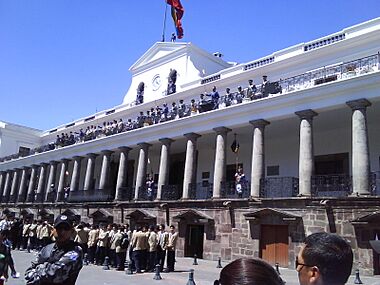
- Brasília – National Office for Brazil
- Guatemala City – National Office for Guatemala
- Havana – Regional Culture Office for Latin America and the Caribbean and other countries
- Kingston – Office for Antigua and Barbuda, Bahamas, Barbados, Belize, Dominica, Grenada, Guyana, Jamaica, Saint Kitts and Nevis, Saint Lucia, Saint Vincent and the Grenadines, Suriname and Trinidad and Tobago as well as some associate member states
- Lima – National Office for Peru
- Mexico City – National Office for Mexico
- Montevideo – Regional Science Office for Latin America and the Caribbean and other countries
- Port-au-Prince – National Office for Haiti
- Quito – Office for Bolivia, Colombia, Ecuador and Venezuela
- San José – Office for Costa Rica, El Salvador, Guatemala, Honduras, Mexico, Nicaragua and Panama
- Santiago de Chile – Regional Education Office for Latin America and the Caribbean and National Office for Chile
Partner Organizations
UNESCO works with many other organizations to achieve its goals. Some of these partners include:
- International Committee of the Red Cross (ICRC)
- Blue Shield International (BSI)
- International Council of Museums (ICOM)
- International Council on Monuments and Sites (ICOMOS)
- International Institute of Humanitarian Law (IIHL)
Products and Services
- UNESDOC Database – This online library has over 146,000 UNESCO documents. These documents have been published since 1945.
Information Processing Tools
UNESCO offers free software tools for managing and analyzing information:
- CDS/ISIS – A system for storing and finding information. It can be used on a single computer or over the Internet.
- OpenIDAMS – A software package for working with numerical data. UNESCO is making this available as open source.
- IDIS – A tool that helps exchange data between CDS/ISIS and IDAMS.
See also
 In Spanish: Unesco para niños
In Spanish: Unesco para niños
 | Percy Lavon Julian |
 | Katherine Johnson |
 | George Washington Carver |
 | Annie Easley |


